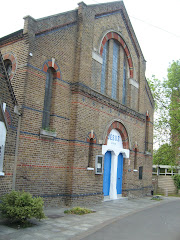The following info is found here on a Barnet local government site
The settlement at Childs Hill is certainly medieval, possibly the 10th century settlement Codenhleawe and later called "Cowhouse". Although a John Knot de Childes Hill is associated with the Peasants' Revolt (1381), the earliest known use of the place name Child's Hill is in 1593. The name is probably taken from a family called Child in the 14th century. The Castle Inn was first recorded in 1751, when Child's Hill was a centre for brick and tile making during the second half of the 18th century, supplying material for building Hampstead, and run by the Morris family.
Being more than 259 feet above sea level (at the Castle Inn), Child's Hill is visible for miles around. From 1808 to 1847 there was anoptical telegraph station, one in a line from the Admiralty to Great Yarmouth. Only the name, Telegraph Hill, remains.
An Act of Parliament in 1826 allowed for the construction of the Finchley Road (completed by 1829) with a tollgate at the Castle Inn. In the early 1850s a Colonel Evans built houses in a field called The Mead, where the Morris brick works had been. The road was later called Granville Road.* In 1856 a new church, All Saints', was built. In 1940 the church was so badly damaged by fire that it had to be substantially rebuilt in 1952.
By the 1870s a number of laundries Childs Hill cleaned clothes for people in the new suburbs of West London and Hampstead. Clothes washed in London were thought to be susceptible to waterborne disease, such as cholera and typhoid, and Childs Hill, then still in the countryside, was supplied by a series of small streams coming off Hampstead Heath. In 1884 the Pyramid Light Works, a candle factory, was the first factory in the Hendon area. Victorian Childs Hill was a "very low" place, with cock-fighting, drunkenness, vice, and housing in Child's Hill in the 1903 was described as a "disgrace to civilisation" and in 1914 Hendon Urban District Council built its first council estate, with 50 houses.
With the motorbuses (1906), the tube at Golders Green tube station (1907), the trams (1909), and finally The Hendon Way (1927) farmland succumbed to suburbia. For entertainment Childs Hill had The Regal in the Finchley Road (1929), which was first a skating rink then a cinema then a bowling alley. In the early 1960s many of the small Victorian houses in the Mead and around the Castle Inn were demolished.
Being more than 259 feet above sea level (at the Castle Inn), Child's Hill is visible for miles around. From 1808 to 1847 there was anoptical telegraph station, one in a line from the Admiralty to Great Yarmouth. Only the name, Telegraph Hill, remains.
An Act of Parliament in 1826 allowed for the construction of the Finchley Road (completed by 1829) with a tollgate at the Castle Inn. In the early 1850s a Colonel Evans built houses in a field called The Mead, where the Morris brick works had been. The road was later called Granville Road.* In 1856 a new church, All Saints', was built. In 1940 the church was so badly damaged by fire that it had to be substantially rebuilt in 1952.
By the 1870s a number of laundries Childs Hill cleaned clothes for people in the new suburbs of West London and Hampstead. Clothes washed in London were thought to be susceptible to waterborne disease, such as cholera and typhoid, and Childs Hill, then still in the countryside, was supplied by a series of small streams coming off Hampstead Heath. In 1884 the Pyramid Light Works, a candle factory, was the first factory in the Hendon area. Victorian Childs Hill was a "very low" place, with cock-fighting, drunkenness, vice, and housing in Child's Hill in the 1903 was described as a "disgrace to civilisation" and in 1914 Hendon Urban District Council built its first council estate, with 50 houses.
With the motorbuses (1906), the tube at Golders Green tube station (1907), the trams (1909), and finally The Hendon Way (1927) farmland succumbed to suburbia. For entertainment Childs Hill had The Regal in the Finchley Road (1929), which was first a skating rink then a cinema then a bowling alley. In the early 1960s many of the small Victorian houses in the Mead and around the Castle Inn were demolished.
* The chapel is here (now in Mortimer Close). It was built in 1870.




